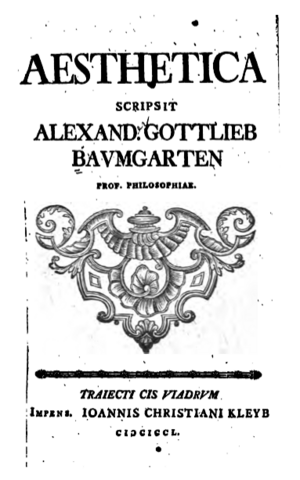Alexander Gottlieb Baumgarten facts for kids
Quick facts for kids
Alexander Gottlieb Baumgarten
|
|
|---|---|
| Born | 17 July 1714 Berlin, Brandenburg
|
| Died | 27 May 1762 (aged 47) Frankfurt (Oder), Brandenburg
|
| Education | University of Halle University of Jena (no degree) |
| Era | 18th-century philosophy |
| Region | Western philosophy |
| School | Age of Enlightenment |
| Institutions | University of Halle Alma Mater Viadrina |
| Academic advisors | Christian Wolff Johann Peter Reusch |
| Notable students | Georg Friedrich Meier |
|
Main interests
|
Aesthetics |
|
Notable ideas
|
Aesthetics as the perfection of sensuous cognition |
|
Influences
|
|
|
Influenced
|
|
Alexander Gottlieb Baumgarten (born July 17, 1714 – died May 27, 1762) was an important German philosopher. He was the brother of Siegmund Jakob Baumgarten, who was a theologian.
Life Story
Alexander Gottlieb Baumgarten was born in Berlin. He was the fifth of seven sons. His father, Jacob Baumgarten, was a pastor (a religious leader). Both of his parents died when he was young.
He was taught by Martin Georg Christgau. This teacher helped him learn Hebrew and get interested in Latin poetry.
In 1733, he studied at the University of Halle. He also attended lectures at the University of Jena. These lectures were about the ideas of another philosopher named Christian Wolff.
What He Taught
Words often change their meaning over time. Baumgarten helped change the meaning of the word "aesthetics." This was a big moment in how people thought about art and beauty.
Before Baumgarten, "aesthetics" just meant "sensibility." It meant being able to feel things through your senses. For example, how you feel when you touch something or hear a sound.
As art became more popular to buy and sell, people started asking: "What makes art good?" Baumgarten changed "aesthetics" to mean the study of good and bad "taste." This linked good taste with beauty.
By doing this, he created a new way to talk about art. He gave people a way to discuss why some art is considered beautiful or good.
His Ideas on Aesthetics
Baumgarten used the word aesthetics to mean taste or a "sense" of beauty. This was different from its older meaning of just "sensation." He gave the word its modern meaning.
Since ancient Greek times, the word had meant the ability to get feelings from your five senses. In his book Metaphysic, Baumgarten said taste is the ability to judge things using your senses. This is different from judging with your mind.
He believed that judging taste was based on feelings of pleasure or displeasure. For Baumgarten, a science of aesthetics would find the rules for artistic or natural beauty. These rules would come from individual "taste."
Metaphysics
For many years, another famous philosopher, Immanuel Kant, used Baumgarten's book Metaphysica for his own lectures. This shows how important Baumgarten's work was.
Georg Friedrich Meier translated Metaphysica from Latin to German. Baumgarten himself had planned to do this, but he did not have enough time.
Works
Baumgarten wrote many books and papers during his life. Some of his most important works include:
- Metaphysica (1739)
- Aesthetica (1750)
See also
 In Spanish: Alexander Gottlieb Baumgarten para niños
In Spanish: Alexander Gottlieb Baumgarten para niños
 | William Lucy |
 | Charles Hayes |
 | Cleveland Robinson |


